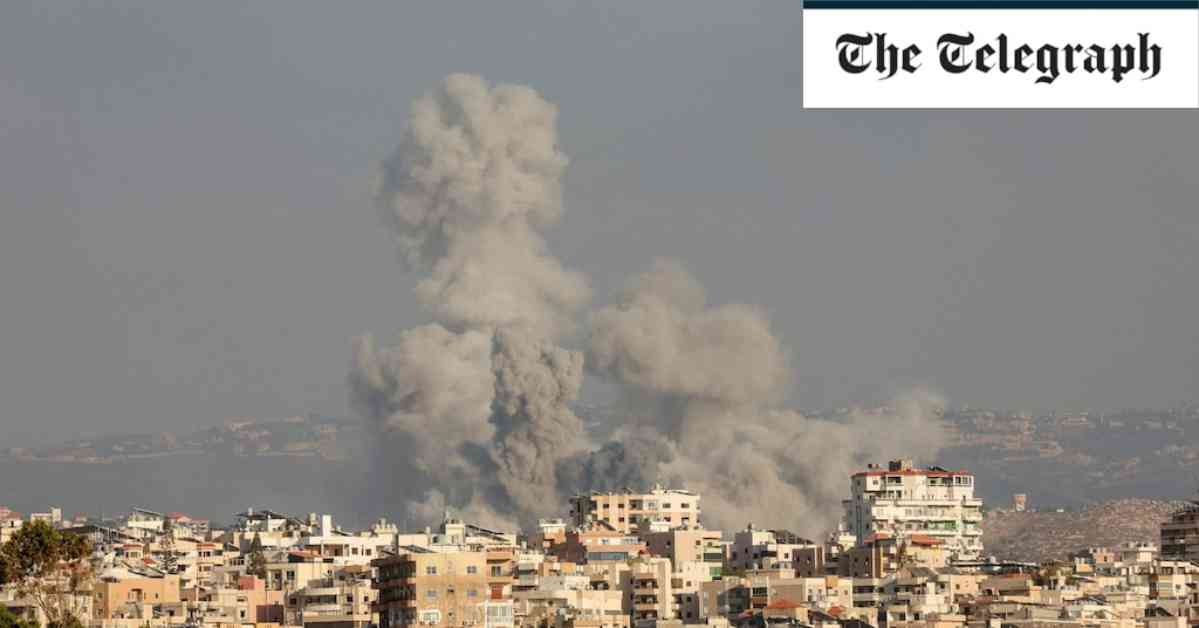The Middle East is currently facing a dangerous escalation of tensions that could potentially lead to a full-fledged war, according to the EU foreign affairs chief. Clashes between Israel and Lebanon’s Iran-backed Hezbollah have intensified, with Israeli strikes on Lebanon resulting in the tragic death of more than 490 people on Monday, including over 90 women and children. This marks the deadliest barrage since the 2006 Israel-Hezbollah conflict, raising concerns about the escalating violence in the region.
EU foreign affairs chief Josep Borrell expressed grave concerns about the situation, stating that the region is on the brink of a full-fledged war. As world leaders gathered at the United Nations on Monday, Borrell emphasized the urgent need for all parties involved to work towards a peaceful resolution. The increasing military strikes, damage, and loss of civilian lives are alarming indicators of the escalating conflict that must be addressed immediately.
In response to the escalating tensions, the Israeli military has issued warnings to residents in southern and eastern Lebanon to evacuate in anticipation of further air strikes against Hezbollah. Prime Minister Benjamin Netanyahu urged residents to prioritize their safety and evacuate the area until the military operation is completed, assuring them of their ability to return to their homes safely once the situation stabilizes.
International Concerns and Calls for De-escalation
As the conflict intensifies, international leaders are voicing their concerns about the potential consequences of a full-scale war in the Middle East. The G7 nations have issued a warning, stating that no country stands to gain from further escalation in the region. The foreign ministers of the G7 emphasized the need to halt the destructive cycle of violence that could lead to a broader regional conflict with devastating implications for the entire Middle East.
The ongoing violence has prompted thousands of Lebanese citizens to heed the warnings and evacuate southern Lebanon. The mass exodus from areas targeted by Israeli strikes reflects the growing fear and urgency among the civilian population to protect themselves from the escalating conflict. The scenes of crowded highways and streets filled with fleeing residents highlight the gravity of the situation and the impact it is having on the local communities.
Escalation of Violence and Loss of Lives
In a tragic development, Hamas field commander Mahmoud al Nader was killed in an Israeli air strike in southern Lebanon, as confirmed by Hamas’ armed wing. The Israeli military reported targeting approximately 1,600 sites in southern and eastern Lebanon as part of “Operation Northern Arrows,” resulting in casualties among Hezbollah militants. The death of a high-ranking Hamas commander and the continued exchange of fire between the two sides underscore the dangerous escalation of hostilities in the region.
The death toll from the Israeli strikes on Lebanon has risen to a staggering 492 people, including children and women. The high number of casualties, injuries, and destruction caused by the strikes is reminiscent of the devastating toll of the 2006 Israel-Hezbollah war, raising concerns about the humanitarian impact of the current conflict. The indiscriminate nature of the violence and the significant loss of civilian lives further highlight the urgent need for de-escalation and diplomatic efforts to prevent further bloodshed.
Live Coverage and Ongoing Developments
As the situation in the Middle East continues to evolve rapidly, live coverage of the conflict provides real-time updates on the unfolding events. With the death toll rising and the humanitarian crisis deepening, the international community is closely monitoring the developments in the region. The ongoing clashes, evacuations, and military operations underscore the urgency of finding a peaceful resolution to prevent the conflict from spiraling into a full-fledged war with catastrophic consequences for all involved parties.
In conclusion, the escalating tensions between Israel, Hezbollah, and other regional actors in the Middle East pose a significant threat to stability and peace in the region. As world leaders convene at the United Nations to address the crisis, the need for immediate de-escalation, dialogue, and diplomatic solutions is paramount to prevent further loss of life and destruction. The international community must work together to avert a full-scale war and seek a peaceful resolution to the conflict before it spirals out of control.












